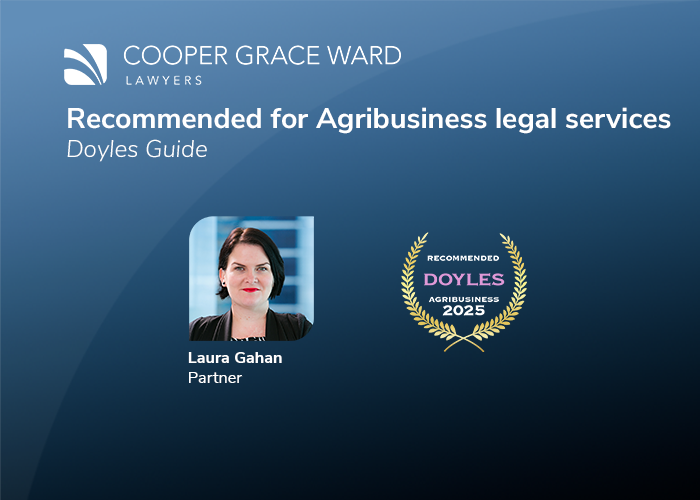Introduction
In 2013, the protection against discrimination on the basis of a person’s gender identity was inserted into the Sex Discrimination Act 1984 (Cth) (SDA) as part of a suite of changes introduced under the Sex Discrimination Amendment (Sexual Orientation, Gender Identity and Intersex Status) Bill 2013. At that time, our legislature recognised that treating a person differently by reason of their gender identity perpetuated the belief that some individuals in society were less deserving of respect than others. The introduction of gender identity discrimination protection represented an effort from our lawmakers to eradicate systemic inequalities faced by the LGBTQ community and to promote a nationwide shift towards inclusivity.
Despite this change, the gender identity protection has received limited judicial consideration since its inception. This has left many employers vexed as to:
- how the protection operates in practice
- the situations in which unlawful gender identity discrimination might potentially manifest within their organisations.
The Federal Court’s recent decision in Tickle v Giggle has provided much needed clarity as to the reach of the gender identity protection under the SDA.
Facts
In February 2021, a transgender woman named Roxanne Tickle downloaded Giggle for Girls, an app offered exclusively to women for the purposes of promoting communication between women. To access the digital service, Ms Tickle was required to upload a selfie of her face to verify that she was in fact a woman. Once uploaded, the selfie was examined by AI to determine whether the prospective user was a man or a woman. In Ms Tickle’s case, the AI software accepted her selfie and she was subsequently granted unfettered access to the platform.
Some seven months later, Ms Tickle was unexpectedly blocked from the Giggle platform by Giggle’s CEO, Ms Grover. The reason for this restriction was that, upon review of Ms Tickle’s account photo, Ms Grover considered her to be a male, and thus someone who ought to be excluded from using a female‑only platform. While Ms Tickle was assigned the male sex at birth, she had undergone gender reassignment surgery to transition to female before downloading the Giggle App. Upon completing her transition from a biological male to a transgender female, the Registry of Births, Deaths and Marriages in Queensland issued her with an updated birth certificate that designated her sex as female. Thus, for the purposes of Ms Tickle’s ‘sex’ and ‘gender identity’, she considered herself to be a woman and therefore eligible to use the Giggle platform.
Ms Tickle subsequently contacted Ms Grover seeking an explanation as to why her app functionality had been restricted. After several failed attempts, Ms Tickle commenced proceedings alleging unlawful gender identity discrimination in the provision of services, contrary to section 22 of the SDA. The crux of Ms Tickle’s claim was that Ms Grover and Giggle for Girls (collectively, the respondents) had subjected her to:
- direct discrimination by providing her with extremely limited functionality to the Giggle App compared to that of cisgender women by reason of her perceived gender identity as a transgender woman
- indirect discrimination by imposing a discriminatory condition that, in order to be permitted access to the Giggle App, Ms Tickle must have either been:
- a cisgender female; or
- determined as having cisgendered physical characteristics on review of a photograph provided during the application process.
Respondents’ contentions
The respondents disputed Ms Tickle’s contentions on the grounds that prohibited discrimination did not occur. Specifically, the respondents argued that Ms Tickle was discriminated against by reason of her sex and such discrimination was permissible given:
- she was born a biological male and was thus a man for the purposes of sex
- sex was a binary concept and could not be changed
- the Giggle App could only be accessed by users of the ‘female’ sex, which meant Ms Tickle did not qualify to use the platform by reason of her ‘male sex’
- the exclusion on men using the app was not unlawful as the special measure exemption under section 7D of the SDA could be enlivened in favour of the respondents.
Decision
Justice Bromwich rejected the respondents’ submissions. His Honour opined that the ‘view propounded by the respondents conflicted with a long history of cases’ that established that sex is not an immutable concept predetermined at birth. Rather, the term was broad enough to encompass the idea that a person’s sex can be changed over time. In effect, this meant that, upon undergoing gender reassignment surgery and being issued with an amended birth certificate, Ms Tickle had successfully changed her sex to female. It was therefore uncontroversial that Ms Tickle was a woman in terms of sex and met the ‘female-only’ condition for accessing the app.
The ancillary issue for Justice Bromwich to consider was whether Ms Tickle’s exclusion from the Giggle App, in circumstances where she met the female-only condition, constituted direct or indirect discrimination on the basis of her gender identity.
Direct discrimination
Pursuant to section 5B of the SDA, for a complainant to succeed in a claim for direct gender identity discrimination, they must first establish that the proscribed action was taken ‘by reason of’ their protected attribute. In Ms Tickle’s case, this required her to prove that Ms Grover, as the alleged discriminator, was aware of her transgender identity when making the decision to restrict her use on the Giggle App.
Ms Tickle could not satisfy this evidential burden. This was because the evidence went no further than demonstrating that Ms Tickle’s exclusion was a byproduct of the respondent perceiving her as a man by the use of visual criteria. In other words, when examining Ms Tickle’s uploaded selfie, Ms Grover formed the view that she was looking at a cisgender male, not a transgender female, and it was in reliance of this erroneous belief that she excluded Ms Tickle from the platform. To that end, no finding of direct discrimination could be supported.
Indirect discrimination
Notwithstanding this finding, Justice Bromwich did form the view that Ms Tickle’s claim for indirect discrimination ought to succeed. In arriving at this decision, his Honour was satisfied that Ms Grover had impermissibly imposed a condition that, to be granted access to the Giggle platform, users:
- had to be cisgender women; or
- on inspection of their photos, had to appear as cisgender based on their physical characteristics.
This condition was not reasonable as it had the practical effect of disadvantaging transgender women, akin to Ms Tickle, who were incapable of complying due to their diverse gender identity.
Takeaways for employers
Employers must be cognisant that the definition of ‘sex’ now adopts a broader operation under the SDA. In effect, this means that the definition of man and woman, for the purposes of sex, is now wide enough to include both:
- cisgender males and females whose sex at birth corresponds with their gender identity
- transexual men and women who have undergone gender reassignment surgery to alter their sex.
Employers must also be acutely aware of the prospective discrimination that could result from the conditions they impose. For example, where a sex-based condition is imposed, such as a condition requiring females to use ‘female only’ bathrooms, these amenities must be made available to both transexual and cisgender women who satisfy the ‘female only’ requirement. Limiting the availability of these facilities to cisgender women only could expose employers to liability for indirect discrimination on the basis of a person’s gender identity.
If you have any questions about discrimination or any of the matters discussed in this article, please contact a member of our workplace relations and safety team







